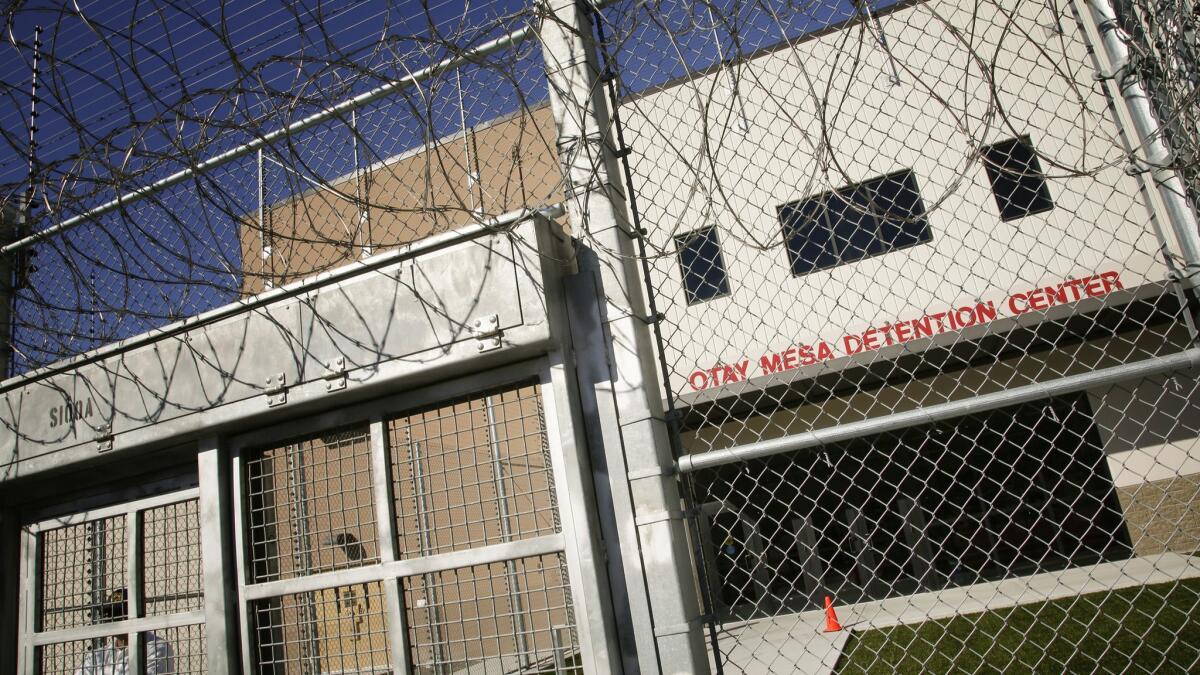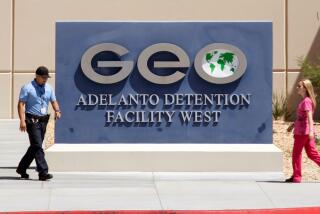ACLU sues for ‘drastic reduction’ of immigrant detainees along California border due to coronavirus

The American Civil Liberties Union is asking a federal judge to order the release of immigrant detainees from two California border facilities amid the coronavirus crisis.
In a class-action lawsuit filed Tuesday, the ACLU of San Diego and Imperial Counties argued that Immigration and Customs Enforcement isn’t doing enough to protect those in its custody. The lawsuit calls for a “drastic reduction” of detainees to allow those who remain to have the space to practice social distancing.
“Court intervention is necessary immediately,” said Monika Langarica, an ACLU attorney. “There is no longer any time to waste.”
ICE declined to comment, citing agency policy about ongoing litigation.
The lawsuit comes a day after a federal judge in Los Angeles ordered ICE to consider releasing all detainees who have a higher risk of complications from COVID-19. The judge said detainees were likely to succeed in their arguments that ICE has shown “medical indifference” as the pandemic has spread in facilities.
The San Diego lawsuit is brought on behalf of four named plaintiffs — two men and two women — all asylum seekers.
One of the men is HIV positive, and one of the women has moderate-to-severe asthma, according to the complaint. Because of their medical conditions, these plaintiffs are particularly concerned that they are at high risk for serious illness or death if they become infected with the novel coronavirus.
Otay Mesa Detention Center, where the two men are held, has already become a hot spot for COVID-19 cases.
On Tuesday evening, ICE’s website indicated that 29 detainees at Otay Mesa had tested positive for the virus. An additional 18 people at the facility in federal criminal custody under U.S. Marshals Service had tested positive as of Monday morning, according to facility documents.
The documents noted that the facility expects to see more positive cases as testing expands to a wider group of detainees.
Twenty-one staff members — 13 CoreCivic employees and eight medical staff — had tested positive for the virus as of Monday afternoon, according to the documents. CoreCivic is the private prison company that runs the detention facility.
So far, ICE has said there are no virus cases at Imperial Regional Detention Facility, which is run by the private prison company Management and Training Corp.
The lawsuit does not specify how many detainees ICE should release from Otay Mesa Detention Center and Imperial Regional Detention Facility. It calls for immediate, emergency release of detainees who have medical conditions that would make them high risk, as well as an “orderly release” of enough detainees to reduce the population to a point that those left inside can practice proper social distancing and hygiene recommendations.
ICE had said that it would consider releasing detainees who are at high risk of severe complications from COVID-19.
When asked Tuesday how many people had been released from its custody through its review, ICE referred to statistics from March 30 that about 160 people out of 600 identified as high risk were released.
In April, ICE announced that it would do another review of cases to try to release more. It is not clear how many have been released since then.
Four detainees from California border facilities who have medical conditions that put them at greater risk — two held at Otay Mesa Detention Center and two at Imperial Regional Detention Facility — were released after the ACLU filed a separate lawsuit on their behalf. After they were let out, the organization moved to dismiss that case.
Acting ICE Director Matthew Albence told a congressional committee on Friday that “our review of our existing population has been completed” and that ICE does not plan to release any other detainees to slow the spread of coronavirus in detention facilities, according to the committee’s website. ICE has released fewer than 700 vulnerable individuals, the website says.
The ACLU’s new complaint details numerous instances of detainees’ struggles to protect themselves from the virus.
Whether soap in a housing unit gets refilled depends on which guard is on duty that day, the complaint says.
Detainees can buy bar soap at the commissary, but for some, that means cleaning parts of the facility that could expose them to the virus, Langarica said.
“These are the kinds of negotiations that people in detention have to make,” Langarica said. “Do I work cleaning this area and expose myself to whatever is in it to have money for soap, or do I not work and then potentially not have money for soap the next time the dispenser runs out?”
Some detainees also reported having to sleep in bunk areas with eight other detainees, meaning that they cannot isolate themselves within their housing units.
“It’s not hyperbole to say that social distancing is impossible in these housing units,” Langarica said. “They cannot sleep or sit more than 6 feet away from other people.”
Other detainees reported not being taken seriously when they tried to report their COVID-19-like symptoms to facility staff. One at Otay Mesa said he was returned to the cell he shared with seven other people after seeing a nurse for his symptoms. He stayed with them for several more days as his fever worsened before he was transferred to the medical unit, according to the complaint.
Another detainee at Imperial had a fever for a week before she was taken out of her housing unit, the complaint says.
Across the country, attorneys have had mixed results after filing lawsuits calling for clients’ release from immigration custody due to the virus. Notably, judges at the Southern District of California have denied several individual requests for release.
On Monday, in one of the most sweeping orders yet calling for the release of immigrant detainees, a federal judge ordered immigration authorities to begin considering for release all detained immigrants at higher risk of complications from COVID-19, admonishing ICE in stark terms for a slow, insufficient response to the pandemic that he said has put lives in jeopardy.
U.S. District Judge Jesus Bernal granted an emergency preliminary injunction at the request of immigrants with serious medical conditions or disabilities who said ICE had failed to take meaningful steps to protect them from the virus over the last month.
Bernal said the detainees were likely to succeed in their arguments that ICE has put them at “substantial risk of harm” because of a monthlong delay in developing a systemwide plan to combat the pandemic in the close quarters of detention buildings.
His order requires the agency to address shortcomings in current plans and create “minimum acceptable conditions” that all facilities must follow to ensure the safety of medically vulnerable immigrants who remain in custody.
In court filings, ICE said it had taken measures to protect detainees and defended them as sufficient and in line with guidance from federal health authorities.
Bernal’s ruling requires all public and privately operated facilities housing immigrants across the country to consider for release all inmates older than 55, who are pregnant or who have serious underlying health conditions.
Morrissey writes for the San Diego Union-Tribune.
More to Read
Start your day right
Sign up for Essential California for news, features and recommendations from the L.A. Times and beyond in your inbox six days a week.
You may occasionally receive promotional content from the Los Angeles Times.







